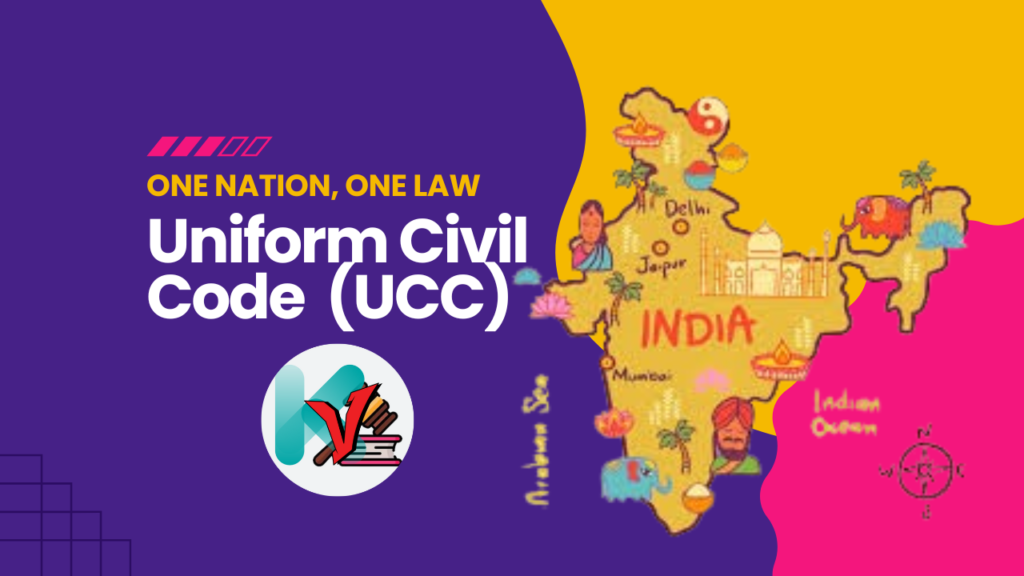The Uniform Civil Code (UCC) is one of India’s most debated legal reforms. It proposes a common set of laws governing personal matters such as marriage, divorce, inheritance, and adoption for all citizens, irrespective of their religious beliefs. The aim is to replace religion-specific laws with a unified legal framework to promote equality and national integration.
What is the Uniform Civil Code?
UCC is a proposed legal framework that seeks to standardize personal laws across different religious communities in India. Currently, personal laws in India are governed by religious scriptures and customs. For example:
- Hindus, Jains, Buddhists, and Sikhs follow the Hindu Marriage Act and Hindu Succession Act.
- Muslims adhere to Sharia-based laws under the Muslim Personal Law (Shariat) Application Act.
- Christians and Parsis follow their respective marriage and inheritance laws.
The UCC aims to replace these separate laws with a single legal framework applicable to all citizens.
Historical Background and Previous Discussions on UCC
The idea of a Uniform Civil Code was first introduced in colonial India but was opposed due to cultural and religious sensitivities. After independence, the UCC was included as a directive principle under Article 44 of the Indian Constitution, which suggests that the state should strive to implement a uniform set of laws. However, successive governments have hesitated to enforce it due to concerns from religious communities.
The debate on UCC gained momentum during the Shah Bano case (1985), when the Supreme Court ruled in favor of providing maintenance to a divorced Muslim woman under the Criminal Procedure Code (Section 125), rather than under Muslim personal law. This led to significant political and religious opposition, eventually resulting in the passage of the Muslim Women (Protection of Rights on Divorce) Act, 1986, which diluted the impact of the court ruling.
In recent years, the Law Commission of India has periodically reviewed the feasibility of UCC. In 2018, the Commission stated that rather than implementing UCC outright, the government should focus on reforming discriminatory aspects of existing personal laws. However, in 2023, renewed discussions emerged as certain states, such as Uttarakhand, took steps to draft a UCC for their jurisdiction.
Constitutional Provisions Affected by UCC
Several articles of the Indian Constitution would be impacted by the implementation of UCC. These include:
- Article 14 (Right to Equality) – The UCC ensures that all citizens, regardless of religion, are treated equally before the law.
- Article 15 (Prohibition of Discrimination) – It prevents discrimination based on religion, caste, sex, or place of birth, ensuring gender justice.
- Article 25 (Freedom of Religion) – UCC could lead to conflicts with religious freedom as personal laws are often based on religious doctrines.
- Article 26 (Freedom to Manage Religious Affairs) – Religious communities might face restrictions in managing their own laws.
- Article 29 (Protection of Cultural and Educational Rights) – Some groups argue that UCC could interfere with the cultural rights of religious minorities.
- Article 44 (Directive Principles of State Policy) – This specifically directs the government to implement a UCC to ensure national unity and integrity.
Arguments in Favor of UCC
- Equality and Gender Justice – The UCC ensures equal rights for men and women across all religious communities, eliminating discriminatory practices such as triple talaq and unequal inheritance rights.
- National Integration – A common law unites citizens, reducing legal complexities based on religion.
- Simplification of Laws – A single law will simplify legal proceedings instead of multiple personal laws.
- Secularism – The UCC upholds the secular nature of the Constitution by ensuring religion does not interfere with civil laws.
- Legal Uniformity – A uniform legal framework would make judicial processes more efficient, reducing litigation arising from different interpretations of personal laws.
Impact on Religion-Specific Laws
The implementation of the UCC would have significant implications for religious communities:
- Hindu Laws: While largely codified under the Hindu Marriage Act and Hindu Succession Act, certain customary practices might be affected, such as traditional joint family property rules.
- Muslim Laws: Islamic personal laws, including polygamy, inheritance rules, and divorce procedures, could be significantly altered. This could be seen as an infringement on Sharia-based laws.
- Christian and Parsi Laws: Changes may be minimal, but marriage and divorce laws might see standardization, affecting annulment and dissolution processes.
- Tribal and Indigenous Communities: Many tribal communities follow their customary laws, and a UCC might override their traditional practices, raising concerns about cultural preservation.
Challenges in Implementing UCC
- Religious Opposition – Many communities fear UCC may undermine their religious traditions and autonomy over personal matters.
- Political Resistance – Due to its sensitive nature, political parties have been divided on its implementation.
- Legal Complexity – Harmonizing diverse laws into a single framework is legally challenging and requires careful drafting.
- Need for Consensus – Any implementation must involve consultation with religious leaders, legal experts, and affected communities to ensure a balanced approach.
- Practical Implementation – Drafting a UCC that accommodates the diverse customs and traditions of India’s multi-religious society is a significant challenge.
Current Implementations of UCC
While India does not yet have a nationwide UCC, some aspects of personal law have already been unified:
- Goa Civil Code: Goa is the only state in India that has a uniform civil code, known as the Portuguese Civil Code of 1867. It applies to all residents, irrespective of religion.
- Supreme Court Rulings: Over the years, the judiciary has taken steps to uphold principles of equality in personal laws, such as the abolition of triple talaq in Shayara Bano v. Union of India (2017).
- State-Level Initiatives: In 2023, Uttarakhand announced plans to draft and implement a UCC within the state, setting a precedent for other states to follow.
International Perspective on UCC
Several countries have implemented uniform civil codes, providing insight into how India might approach the issue:
- France and Turkey – Have strict secular legal systems that apply the same civil laws to all citizens.
- United States – Civil laws are secular and uniform, with no separate personal laws for different religious communities.
- Indonesia and Malaysia – Follow a dual legal system where religious laws govern personal matters while civil laws apply to other aspects.
Potential Roadmap for UCC Implementation
Given the sensitivities involved, the following steps could help in implementing UCC gradually:
- Codification of Personal Laws – Instead of outright abolition, existing personal laws could be standardized to eliminate discriminatory practices.
- Pilot Implementation – Introducing UCC in select states, such as Uttarakhand, which has already passed a version of UCC, before nationwide enforcement.
- Public Awareness Campaigns – Educating citizens about the benefits of UCC to build public support.
- Judicial Review – Ensuring that UCC aligns with fundamental rights and does not violate constitutional protections.
- Gradual Reforms – Instead of immediate implementation, introducing reforms step-by-step in marriage, divorce, and inheritance laws.


